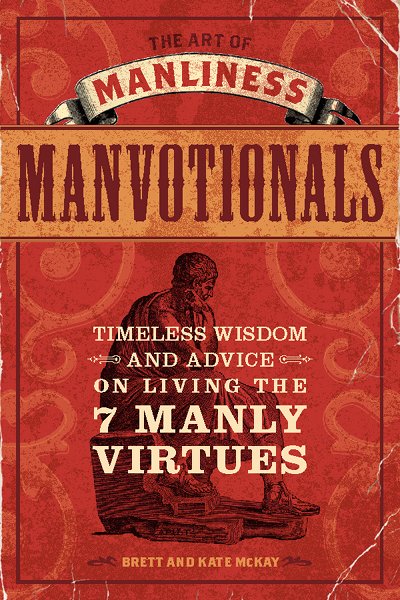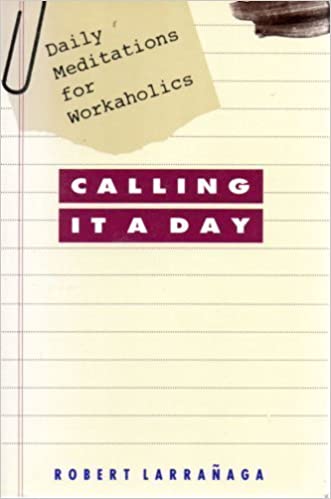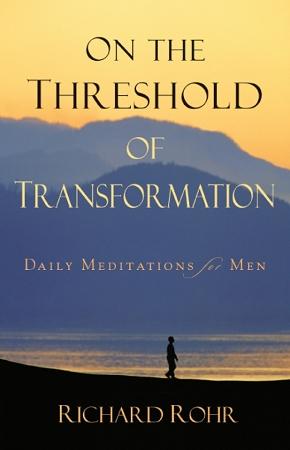
Each day, too, acquire something which will help you to face poverty, or death, and other ills as well. After running over a lot of different thoughts, pick out one to be digested thoroughly that day. —Seneca
Today, we largely associate daily “devotionals” — short, reflection-spurring texts — with religious scriptures and faith-themed books which feature musings, challenges, and brief bits of inspiration for each day of the year.
But as Seneca proves above, for millennia, devotional-type exercises have been engaged in not only for religious purposes, but for philosophical ones as well. The devotional habit is really for everyone, and is more important than ever in a time of great uncertainty and acute existential stress.
If you’re part of a faith tradition, you probably already know of some popular devotional books to study. Below, we’ll highlight some spirit-edifying but secular devotional texts that men of every stripe may enjoy and find uplifting.
First, however, let’s dig into why you should consider making devotional reading part of your daily routine, and how to get the most out of this practice.
The Benefits of Daily Devotional Reading
While the effort needed to sustain the devotional habit isn’t onerous — reading just a few pages of text for a few minutes each day — the benefits it will accrue to your life are significant:
1. Maintains a deeper element in your life. When you were a teenager and in your twenties, perhaps you read religious and philosophical books with some frequency. Maybe you even had a daily devotional practice back then. You thought big thoughts. You pondered big questions. But then you got a real job, and got married, and had kids. And that soulful reading and reflection dropped out of your life. You started living on the surface of things, metaphorically “paycheck to paycheck,” in that your thoughts only extended to taking care of life’s basic necessities from one day to the next.
A daily devotional practice restores a more existentially profound element to your life, so that you don’t lose track of life’s deeper dimensions amidst the more mundane stresses and urgencies of day-to-day living.
2. Keeps your focus on the most important things. While we like to take a kind of “one-and-done” approach to life’s great truths — believing that once you learn and know something, you never have to think about it again — the reality is that we need constant, daily reminders of who we want to be. Daily devotionals keep your most important values at the forefront of your mind, where they can actively influence your decisions.
3. Injects a bit of ritual into your day. The power of ritual is undeniable, especially in a chaotic world. There are a number of ways to add spirit-centering structure to your routine; a daily devotional reading is one of the most powerful.
Some Guidelines for Your Daily Devotionals
1. Morning is best. You can do your devotional time whenever it works for you. But, there’s a case to be made for scheduling it for the a.m.
For a lot of people, the morning starts with a handful of stressful emails or some social media/newsy doomscrolling. But given that how you start the day will influence your mindset during the rest of it, it’s hugely beneficial to kick things off with something that’s more uplifting than such mind-muddling noise.
Reading a devotional doesn’t have to be the very first thing you do after getting out of bed; if you need a shower and a cup of coffee right after rising, that’s just fine. But make it happen before getting into the real meat of your day — whether that’s before anyone is awake and the house is quiet, or in the first few minutes that you sit down to your desk for your workday (if your job allows for that sort of thing). A morning devotional practice gets your whole day off on the right foot, centering your soul before you wade into the weeds of “worldly” cares and providing edifying grist to chew on in the hours to come.
2. Write down something to think about. What’s the benefit of doing intentional morning readings if the thoughts it provokes just leave your head the minute something stressful encroaches on your day? By writing down a note or quote, you’re further cementing these insights into your consciousness, and even more so when you regularly return to your notebook/journal throughout the course of the day (to add additional thoughts/review past musings) or the next morning.
3. Consider reading it aloud. Much poetry was intentionally written to be read aloud, and prose can benefit from oral recitation as well. Abraham Lincoln preferred this practice, observing: “When I read aloud two senses catch the idea; first, I see what I read; second, I hear it, and therefore I can remember it better.” In addition to writing it down, this is another way that powerful words can lodge themselves in your memory.
4. Don’t fret if you miss a day. Don’t beat yourself up about missing days of devotional reading; life’s too short for that crap. Cut yourself some slack and just move on ahead the next day.
You can find more tips for deeper spiritual study here.
10 Ideas for Daily Devotionals
Some books are specifically structured for devotional reading; that is, they’re made up of short entries, meant to be read one day at a time, often over the course of a year.
But other kinds of books, even if they’re not explicitly designed for devotional reading, can work too. Anything with short chapters or easily digestible sections that move your spirit can be used for the purpose. Essays, poetry, letter collections, even some of the great novels work well.
Below we offer 10 recommendations of non-religious texts that can serve as worthy reflection-generating fodder for a more edifying daily routine:
Manvotionals by Brett and Kate McKay

The second Art of Manliness book, published almost a decade ago, is a collection of philosophy, self-improvement, and wisdom texts, ranging from Aristotle to the success books of the late 19th and early 20th centuries to the speeches and writings of Theodore Roosevelt. The myriad poems, quotes, and essays contained within — centered around 7 primary virtues — are designed to inspire men in particular to cultivate the highest ideals of character and live a truly flourishing life. You won’t always be familiar with the authors of the ideas, but you’ll always be vigorously renewed in your energy for the day’s tasks.
Meditations on the Wisdom of Action by Kyle Eschenroeder

In 116 short, pithy, gut-punchingly inspiring chapters, Kyle Eschenroeder expounds on the meaning of action and what it looks like in our modern world. Kyle possesses the soul of a philosopher in the body of an entrepreneur. If philosophy doesn’t lead to action — to answering the question of how to better live this thing we call life — what good is it, really? In this book, Kyle takes the best action-oriented philosophical nuggets from a wide variety of authors and luminaries and riffs on them to create his own unique set of proverbs and calls to . . . action. Supping daily from this book will continually push you to turn your abstract intentions into concrete realities.
The Daily Stoic by Ryan Holiday

In The Daily Stoic, Ryan Holiday grabs an inspiring Stoic quote for each day and adds his own ideas and questions to ponder on and use as grist for becoming a better person. It’s a great collection, though I must mention that the original sources also lend themselves quite well to daily reading: Meditations by Marcus Aurelius, Letters from a Stoic by Seneca, Epictetus’ writings, etc. Regardless of the source, Stoic philosophy will leave you better prepared to meet the day, and its attendant, inevitable annoyances, with patience and perspective.
In general, philosophy is a great fount of daily devotional reading. Ancient wisdom is often easier to digest in small chunks than en masse.
Essays of Montaigne

Brett has called Montaigne the first blogger; it’s an astute observation about a man whose 107 essays from the late 16th century cover a range of topics from the philosophical (“On sadness,” “On the length of life,” “On prayer”) to the more practical and mundane (“On smells,” “On drunkenness”). Even within the essays, Montaigne goes from subject to subject, eventually coming back to the titled topic . . . most of the time. He displays the full range of human feeling, logic, irrationality, and hypocrisy, which is exactly what makes his essays so interesting. He’s clearly processing ideas while writing them, and going back and forth between various conclusions. You’re guaranteed to find something to think about within each chapter. The essays average about 12 pages, making them easily digestible at the pace of one per day.
A Calendar of Wisdom by Leo Tolstoy

While Tolstoy is deservedly most well known for his epic, door-stopping novels, his daily reader, A Calendar of Wisdom, should get some love too. Compiled over the course of about 15 years, Tolstoy heavily researched this collection of quotes, proverbs, and sayings which spans religious traditions and schools of philosophy. Though a deeply Christian man, Tolstoy understood that great ideas which resonated within the soul could come from anywhere. Organized by subject and with an entry for each day (using 3-4 quotes/sayings plus a short thought from Tolstoy), the compiler and author himself used it for a good portion of his life.
War and Peace, often listed as the greatest novel ever written, is also particularly well-suited to daily reading over the course of a year, given its 361 short chapters. I’m leading a paid book club which is doing just that in 2021; get more info at thebigread.substack.com.
The Secrets to Power, Mastery, and Truth: The Best of William George Jordan

This anthology contains the very best personal development essays of Gilded Age writer William George Jordan. All of the chapters are short and certainly devotional in nature; they’re rich in incisive, edifying insights, including vivid metaphors that help the reader see his life through a transformative lens. The real benefit of Jordan’s work is that you can tell he was pushing back against the individualistic, get-rich attitude of his era and fought to instill in folks the less flashy, but more meaningful values of compassion, service, honesty, forgiveness, and the value of a daily fresh start.
Walt Whitman’s Poems

Poetry, in general, is a great way to consume a bit of daily wisdom and beauty; sometimes the most transformative insights are those that waft through your mind indirectly, rather than being hammered home head-on. It can be an intimidating genre to dive into, though. Admittedly, I don’t really get most poetry and it often leaves me feeling more confused than inspired. There are a few exceptions, in my opinion, which resonate with just about anyone: Robert Frost, Emily Dickinson, Henry Wadsworth Longfellow, and most powerfully, for me, Walt Whitman. His soul-stirring poems capture the spirit and vigor of the American ideal and experience better than anything I’ve ever read, and each poem finds some line or two worth remembering and chewing on — “I contain multitudes,” “Be curious not judgmental,” “Let your soul stand cool and composed,” etc.
The Works of Thoreau and Emerson

Thoreau and Emerson, those great American transcendentalists, are in the same vein of thought as Whitman, but with more concrete ideas and nuggets of wisdom than is to be found in the latter’s poems. Self-reliance, nature and the outdoors, self-improvement, philosophy — these themes and more abound in the pages of these great thinkers’ journals, letters, essays, and other written works. Though full of spirit and calls to transcendence, they’re never opaquely mystical nor dogmatic, and have spoken to the deepest cores of human longing and our perpetual search for meaning for the last 150+ years. Nearly all their content is suited for daily reading, but Jim Mustich, author of 1,000 Books to Read Before You Die, recommends three in particular for this devotional purpose: The Spiritual Emerson, First We Read Then We Write by the late Robert Richardson, and The Journal of Henry David Thoreau. I might also add The Daily Henry David Thoreau, compiled by biographer Laura Dassow Walls.
Calling It a Day by Robert Larranaga

If you’re someone who struggles with being a workaholic, or perhaps, in our work-from-home era, the delicate task of balancing work time and home/spouse/kid time, Robert Larranaga’s daily meditations draw from both spiritual principles and sound business ideas in order to give readers the permission they need to put down their phone or laptop. As hard as it is for some men to admit, more work does not necessarily equate to better work. This is a book that helps to remind you of that on a daily basis.
On the Threshold of Transformation by Richard Rohr

Franciscan friar Richard Rohr has a number of daily meditation works (as well as a great daily email), but by far the best of the bunch is his collection aimed specifically at men. While he admits coming from a Judeo-Christian tradition, he acknowledges that there are other viewpoints and doesn’t lean solely on Christian ideas in this set of daily meditations. The first line of Day 1 really sets the tone: “At some point in time, a man needs to embark on a risky journey.” Each day, after a couple paragraphs of a virile main idea, Rohr asks a simple question that’s sure to stir up big questions and honest, if scary, reflections. This book is my favorite title on this list.
Combine any number of these books, use them alongside a daily journaling practice, read them in communion with loved ones or friends — wherever your devotional practice takes you, may it serve to challenge, enlighten, refreshen, and inspire.
Tags: Books






